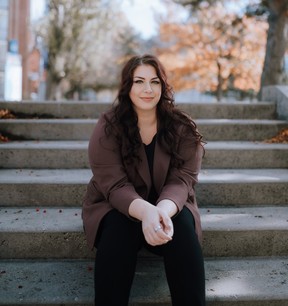Aniko Farkas in Kelowna. PHOTO BY BRANDI LEE /Brandi Lee Photography
A social worker tells her story of being off work for a year due to a serious psychological injury. She is not alone. What are the solutions to this growing trend?
Aniko Farkas was already feeling sad when she arrived at a Kelowna supported housing building for her Saturday evening shift: A longtime tenant, with whom she had a close bond, had died suddenly three days earlier.
Farkas, who was also an intake worker with Interior Health, had just come off an eight-hour shift from that job. Now was her first chance to grieve with colleagues at her part-time, support-worker job in the facility for people with substance use and mental health challenges.
After commiserating over the loss with her co-workers, they alerted her that they hadn’t seen another resident, Richard, all day, nor had he collected his medications the night before.
Farkas knew that was unusual. She’d known Richard, who was in his 50s, for nine years.
“I can’t think of a client who I worked more closely with or cared for more. And my second (closest client) was the gentleman who passed away three days prior,” she said, fighting back tears.
Richard “has probably had one of the hardest lives I’ve ever heard of … but he was still so kind and so bubbly and so amazing, despite everything.”
A colleague hurried to check on Richard, and was relieved when she heard the shower running behind his room’s closed door.
About an hour later, Farkas dropped by his room to chat. The shower was still running.
She opened the door a crack and called his name. No answer. She peered inside, still no sign of him.
“I knew something was wrong,” she said. “Finally, I look in the bathroom and he is on the ground, facedown.”
She frantically phoned a co-worker to call 911.
Richard was not breathing. She knew he was gone, and suspected he’d become another victim of B.C.’s horrendous overdose crisis.
She had been through this before. A year earlier, Farkas had found another resident in the same building dead in his room, drug paraphernalia scattered nearby, her desperate attempts to revive him fruitless.
She returned to work a few weeks after that first death.
But the loss of Richard would unleash the pain from a decade of traumatic events, leading to such psychological damage that she would need more than a year off work to heal.
This is a growing trend in B.C., where the number of workers receiving help for certified psychological injuries, such as PTSD, has more than doubled since 2018. The COVID-19 pandemic, the overdose crisis, and short-staffed, stressed-out workforces all play a role.
WorkSafeBC, the provincial government, and employers have begun to make changes to address this escalating situation, although more needs to be done. Workers with psychological injuries are off the job four times longer than those with serious physical ailments and cost the system three times as much.

Farkas, 35, is sharing her story in hopes it will help other workers recognize the signs, earlier than she did, that they need help.
It was August 2020 when she lost Richard, a pseudonym because Farkas doesn’t have permission to identify him. When firefighters arrived, she retreated to a corner in his small room, the farthest spot away from the bathroom, covering her eyes as she wept.
When firefighters pulled the body into the bedroom, so they had more space to work, Farkas knew she had to get out of there. But she couldn’t bear to look at Richard.
So, with her eyes squeezed shut, she felt her way out using the walls and furniture to guide her, stepping over Richard as she finally left his room.
The rest of her shift was filled with police interviews and phoning co-workers. That evening and the next day she was a wreck: “I can’t sleep. I can’t close my eyes without seeing him. I’m crying all the time.”
On Monday, she showed up for her job at an Interior Health public health centre. A concerned boss sent her home.
After a week, she returned to both her jobs, but two more clients in the supported housing facility would die shortly after Richard, Farkas said.
‘I knew I wasn’t OK’
In that fall of 2020, she began having panic attacks and gastrointestinal problems, and yet took on another job. She’d just completed her social worker degree and was employed to support patients at a Kelowna hospital, subjecting her to more distressing situations.
“I’m at work, crying in the bathroom,” she recalled.
“I knew I wasn’t OK. And to help cope, which again wasn’t the right thing to do, I just did not slow down. I took on more … especially during a pandemic when I felt like I was doing very important work and people needed me.”
There were never concerns about her performance at work, Farkas said, but in January 2021 a boss at Interior Health said she was worried about the young woman’s well-being. So Farkas saw her doctor, who had been monitoring her decline, and finally began the long process of addressing her psychological burdens.
She filed a claim with WorkSafeBC, the provincial agency that adjudicates and provides compensation and support for injured workers, and would be away from her jobs for about 14 months.
“It was the worst year of my entire life,” Farkas said. She slept for hours during the day, was depressed and suffered more panic attacks.
A psychiatrist diagnosed her with post-traumatic stress disorder and derealization, when someone feels disconnected from other people and their surroundings.

Unfortunately, ordeals like Farkas’s are not unusual, said Tanya Houghton, WorkSafeBC’s senior director of health-care services.
“There are definitely industries that have been hit much harder by the pandemic, and what we’ve seen is a rise in those mental health claims,” she said.
Some workers are sidelined by a single horrific event, while others are crippled by a series of stressful incidents that are cumulative, she added.
Since provincial legislation was changed in 2012 to allow workers to pursue compensation for a psychological injury following a traumatic workplace event, rather than just a physical injury, people have become increasingly more comfortable with making these claims, Houghton added.
2,000 psychological injuries approved in 2022
The number of psychological injury claims reported to WorkSafe jumped to nearly 6,000 in 2022 from 3,644 in 2018. And, of those claims, the number approved by the agency more than doubled to almost 2,000 last year from 914 in 2018.
The professions with the highest number of approved claims were nurses, paramedics, and social and community service workers, the sector that includes people who work in supportive housing facilities.
When people think about workers who have had distressing responsibilities during the dual crises of the pandemic and the overdose epidemic, they often envision nurses and paramedics, Houghton said. “They forget that there is an entire support system out there within communities that are on the ground, supporting those individuals who are experiencing addictions or homelessness.”
Most workers will report a physical injury suffered at work right away, but many will delay acknowledging a psychological injury, and by the time they seek help it can take longer to treat, Houghton said.
Between 2018 and 2022, workers with a psychological injury were off the job for an average of 178 work days, compared to 39 days for those with a physical ailment, according to WorkSafe. And the average cost for psychological injury claims was $136,000, three times higher than for physical ones, which covers services such as counselling, trauma programs, and reintegration to work.

Farkas is grateful for the counsellors, occupational therapists, rehabilitation assistants and other experts she connected with through WorkSafeBC, as well as the doctors who sorted out what medication would best work for her.
WorkSafeBC started facilitating her return to work in January 2022. She attended training in April and returned to her jobs in May.
What Farkas learned during her time off was that an accumulation of events led to her injury.
After becoming an addictions counsellor in 2012, she worked many hours a week at Interior Health and in the Kelowna supported housing facility, while also attending university full time, graduating with her social work degree in June 2020.
Looking back on those years, Farkas now realizes, she kept herself too busy, partly in an effort to avoid confronting some difficult events, starting with the unexpected death of her mother in 2007 when she was just 19.
In her work, she dealt head on with the poisoned drug crisis, which has claimed more than 12,000 lives since the province declared a state of emergency in 2016, learning how to use naloxone to reverse clients’ overdoses.
In July 2019, though, she was unable to save a man in his 20s after she found him lying on the floor in his room in the supported housing building. The 911 operator instructed her and a colleague to perform CPR, but Farkas kept insisting it was too late.
“I just remember screaming, ‘We can’t, we can’t.’” To this day, she is haunted by the touch of his cold body.





